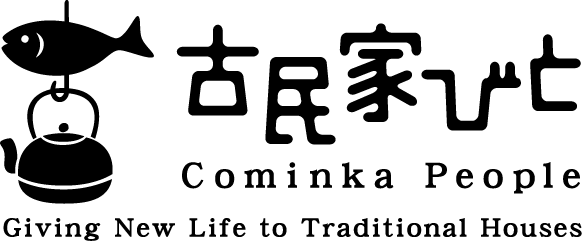古民家オーナーインタビューvol.4
「おぢか古民家ステイ・レストラン」(後半)
Cominka Owner Interview vol.4 “Ojika Cominka Stays and Cominka Restaurant”(2)
English here.
資金、法律、コンセンサス
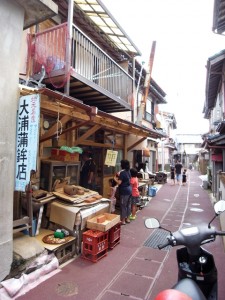
アレックスさんが初めて来島した後、民泊事業等をやりながら、3年かけて古民家ステイ・レストラン事業の立ち上げの準備を進めました。資金調達、法的問題の解決、島民のコンセンサスを得ることなど、多くの課題がありました。
個人所有だった古民家を町に寄付してもらい、助成金を申請しました。国の援助がなければ、到底実現出来なかったと思います。建築基準法のクリアや簡易宿泊施設の許可をとるのにも時間がかかりました。
婦人会の集まりや、公設民営ですので、議会に説明しました。改修前の古民家はボロボロで、収支計画書を作って見せても、「本当にお金がもらえるの?誰が払うの?」と毎回言われました。しかし、絶対に成功させないといけない事業だから、成功するかどうかの議論ではなくて、どうやったら成功するのか?という議論を行うようにしました。
地元の変化
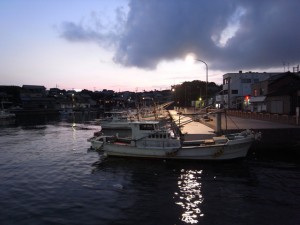
古民家ステイ・レストラン事業の客層は、民泊事業とは違います。実際に高いお金を払って小値賀に来てくれる方がいることにびっくりされましたし、お客様に地元のお店を紹介しているので喜ばれています。
又、外から来た人が島のために頑張っているのだから自分達も頑張らないと、という雰囲気が生まれてきました。若い人達がUターンしてきたり、100人位の方がIターンしてきたりして、この1~2年の間に、新しいお店が7軒オープンしています。
しかし、まだまだです。アンバランスになってしまった島の人口構成を立て直し、島での仕事や生活が受け継がれていけばと思っています。
古民家の「保存」ではなく「活用」

ハードが出発点かもしれませんが、ハードはあくまでも手段として、「何のためにやるのか」という目的を別に設定しないとダメだと思います。立派な家だから、というだけでは残らない。「保存」ではなく、「活用」するという立場に立って、古民家自体が稼がないと残らないのです。
古民家ステイ・レストラン事業の出発点も、アレックスさんと古民家の出会いでした。どの古民家もギリギリの状態で、今、改修できて本当に良かった。しかし、建物を残すことが目的ではなくて、自分達の生活のために活用しています。そうしないと島のためにはならないのです。
今後の課題
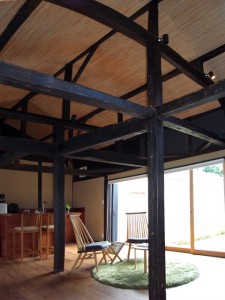
古民家ステイ事業は、まだまだこれからです。事業開始から2年経ち、今年の夏もたくさんの方に来て頂きました。ピーク時は50~60%という稼働率ですが、12月~2月は厳しい。そこの部分の稼働率をどう上げるかが今後の課題です。
現在のお客様は、30~40代の新しい観光地を開拓していく人達です。感度の高い女性客が中心ですが、今後は、旅行会社等とも連携しながら、より幅広いお客様を呼び込みたいと考えています。小値賀ブランドも少しずつ出来ているので、加工品の販売も伸ばしていきたいです。
そして、もっと仕事を増やしていかなければと思っています。事業を手伝ってくれているお母さん達にもっとお金を払えるようにしたいのです。おぢかアイランドツーリズムからの収入があるから漁業を続けていける、子育てができる、家業を子どもに継がせられる、となっていって欲しいです。
取材:早川欣哉(古民家びと)
翻訳:齋藤高晴(コミューナ・トランスレーション・デザイン有限責任事業組合)
高砂樹史さん
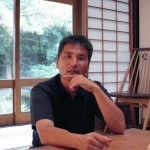
〒857-4701
長崎県北松浦郡小値賀町笛吹郷2791-13 フェリーターミナル内
TEL:0959-56-2646 FAX:0959-56-3530
小値賀島のウェブサイト http://ojikajima.jp/
小値賀島の古民家ステイのウェブサイト http://ojika-stay.jp/
おぢかアイランドツーリズムさんオススメのスポットはこちら!
より大きな地図で おぢかさんのオススメスポット を表示 |
この地図の周辺スポットを見る 1)野崎島の旧野首教会 1908(明治41)年、教会建築の名工、鉄川与助によって設計・施工され、創建当時の原形が保たれており、全国からも高い評価を受けています。 所在:長崎県北松浦郡小値賀町野崎島 2)地ノ神島神社
肥前型鳥居の中でも旧平戸藩内にのみ分布する鎮信鳥居と通称される珍しい形式の鳥居。向かい側にある野崎島の沖ノ神島神社と対になっている。 所在:長崎県北松浦郡小値賀町 |
ENGLISH
Cominka Owner Interview vol.4
“Ojika Cominka Stays and Cominka Restaurant”(2)
Fund, legal issues and getting consensus
We had a cominka which used to be a private property donated to the town and applied for a grant. It was impossible without support from the central government. Meeting the standard of the Building Standard Act and acquiring a license of accommodation facility also took a long time.
I presented the idea to a women's club and the town council, as for this program the structure is taken care of by the government while a private company does the management. The cominka before renovation was pretty run-down and every time I showed them a business plan, I was asked "Are you sure?". But as it was a project we absolutely had to succeed, I lead the discussion not to whether or not it would be successful, but what should we do to make it successful.
Change in the community
Also, the general atmosphere of "those who came from outside are working hard, so why don't we do it?" is emerging. Young people are returning and about a hundred of people have moved in to the island, opening seven new shops/restaurants in this couple of years.
But it's still a long way to go. I hope we can improve the unbalanced population graph, making it possible for work and lifestyle of the island to be handed down to the next generation.
"Utilization" rather than "preservation" of cominka
Starting point of this program was the encounter between Alex and our cominkas. Every cominka was barely standing, and it was really wonderful we could renovate them in this timing. Yet keeping cominkas is not an end in itself. It's something to be utilized for our own lives, otherwise it doesn't contribute to the island.
Upcoming challenges
Our current customers are those in their 30's-40's who develop new tourist spots. Although at the moment their main segment is active and refined women, we are planning to appeal to wider customers in near future in collaboration with travel companies. As we are developing Ojika brand of products, we are hoping to promote our processed goods as well.
Above all, we want to produce more jobs. We want to pay more for local mothers who are working for our programs. We are hoping that income from Ojika Island Tourism makes it possible for them to continue fishing, raise children and let their children take over their family business.
